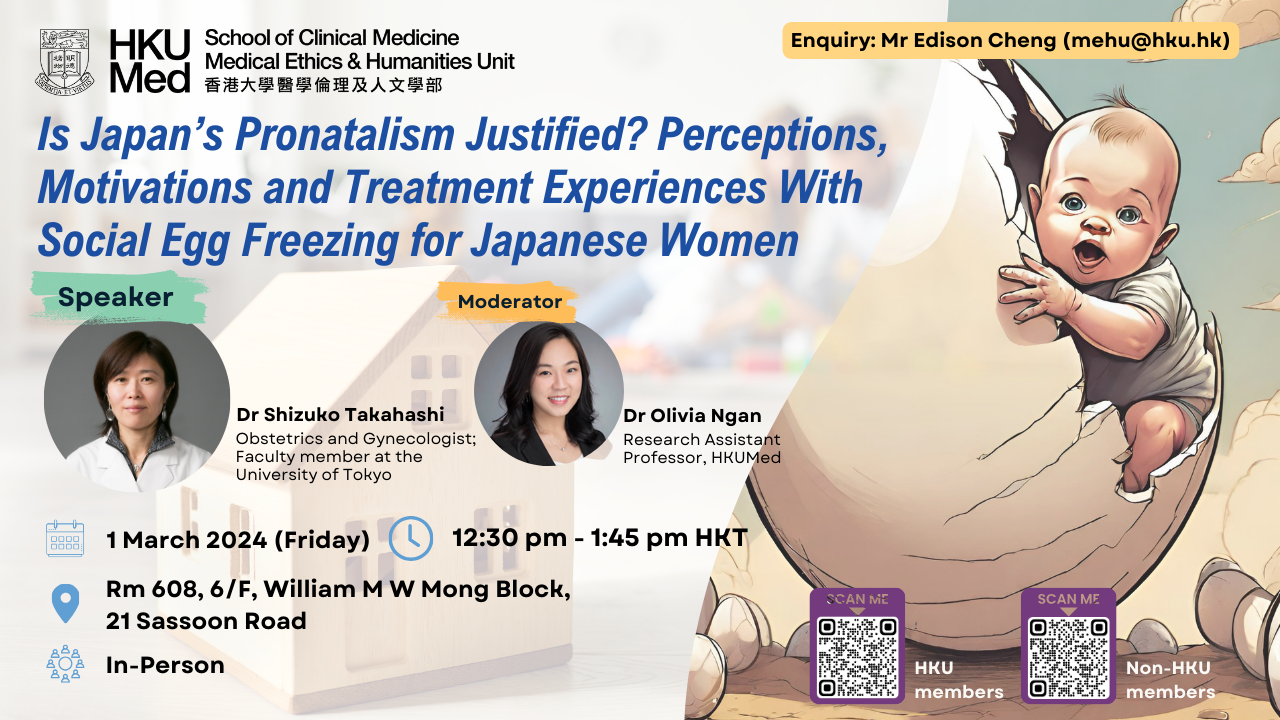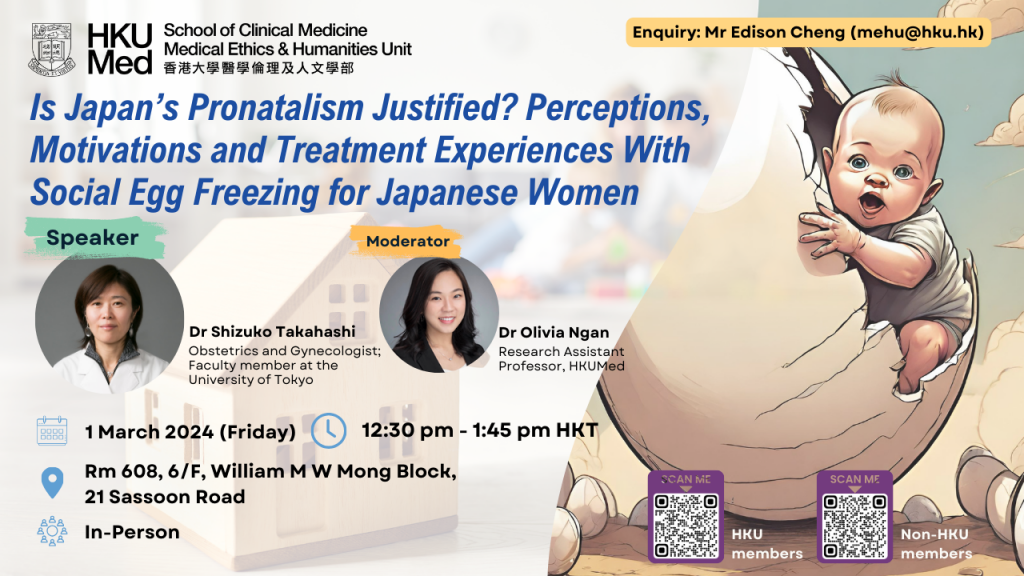Registration Link: For HKU members / For non-HKU members
Lunchtime Seminar
Title: Is Japan’s Pronatalism Justified? Perceptions, Motivations and Treatment Experiences With Social Egg Freezing for Japanese Women
Date: 1 March 2024 (Friday)
Time: 12:30 – 1:45 pm HKT
Venue: Rm 608, 6/F, William M W Mong Block, 21 Sassoon Road
Mode: In-person
Registration Link: For HKU members / For non-HKU members
Abstract:
Social egg freezing (EF) has been gaining awareness as an option to delay motherhood and has become a national trend in Japan. Given declining birth rates (birthrate 1.08 for 2022), the Tokyo Metropolitan government began subsidizing EF for women ages 18-39 in September 2023, making Japan the first country to do so. The potential effectiveness and social impact of this subsidy needs to be determined.
Using keywords obtained from the government subsidy, and previous studies from women who attended the EF orientation at our clinic, we analyzed the advantages and disadvantages of EF for Japanese women through a web-based survey of media articles and governmental homepage statements in Japan.
EF can be seen as a temporary reprieve from childbearing, with many women discovering it through social media influencers who have undergone EF, which is culturally seen as a “kakkoii” (cool) thing to do in helping women prioritize their careers.
While EF has gained acceptance, obstacles exist: the financial burden, followed by the low pregnancy rates. Surprising, the risks associated with pregnancy and delivery at a later age were not included in their rationale.
We argue that in promoting this subsidy, the government should clarify not only the benefits to reproductive freedom, but also the potential harms. For example, most women do not use their frozen eggs as intended. If a suitable partner isn’t found, the eggs will need to be disposed of. Indeed, while EF may appear to free women from biological constraints, it may actually increase the pressure on women to get married since IVF and sperm donation is only offered to married couples in Japan.
More ethical debate is required to determine if EF enhances reproductive freedom or creates undue pressure on women through pronatalist societal norms.
Speaker:
Dr Shizuko Takahashi
Dr Takahashi is an Obstetrics and Gynecologist at major Medical Centers in Tokyo, Japan. She also serves as a faculty member at the Department of Biomedical Ethics, Graduate School of Medicine, University of Tokyo, and as a summer faculty at the Yale Interdisciplinary Center for Bioethics.
After earning a BA in Fine Arts and Molecular Biology from Reed College in 1997, she pursued medicine and obtained her PhD from the University of Tokyo, Graduate School of Medicine, in 2010. In 2018, she was a fellow at the MacLean Center for Bioethics at the University of Chicago.
Dr Takahashi’s research focuses on reproductive ethics, preimplantation genetic testing, pediatric ethics, and cross-cultural bioethics. Her work has been published in BMC Medical Ethics, Lancet, BMJ, and Genetics in Medicine.
Apart from her medical contributions, Dr Takahashi is an accomplished children’s book writer and illustrator. Her debut book, “The World Caught a Cold,” addressing COVID-19, has been translated into multiple languages and is distributed globally through the Yale library since its publication in 2020. She was awarded from the Cabinet Office for her achievements. She is currently working on a picture book on genetics starting from the embryo.
Moderator:
Dr Olivia Ngan
Research Assistant Professor, Medical Ethics and Humanities Unit, HKUMed
Dr Ngan has multidisciplinary training in neuroscience, bioethics, and public health. Her research passion lies in reproductive health, public health genomics, rare diseases, and empirical bioethics. She is deeply engrossed in unraveling ethical dilemmas linked to the practical implementation of technologies in genomic medicine and healthcare services, focusing on reproductive technologies, prenatal screening and diagnosis, and newborn screening.
Welcome to join us!
Enquiry: Please contact Mr Edison Cheng (mehu@hku.hk).


